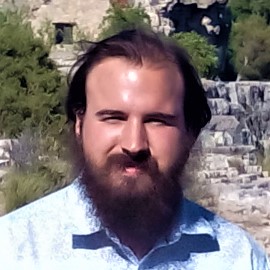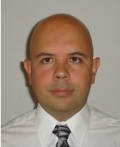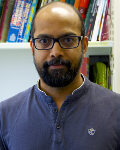 Emma Campbell; campbelle3@cardiff.ac.uk
Emma Campbell; campbelle3@cardiff.ac.uk
Emma has been working as a core PDRA at the Catalysis Hub since August 2021, and works closely with the Central Laser Facility to use their Kerr-gated Raman and fluorescence lifetime techniques to characterise catalytic intermediates in reaction mechanisms. Her current projects include studying propane dehydrogenation and chemical recycling of end-of-life plastics. Emma completed her PhD in 2021 through UCL under the supervision of Prof Andrew M Beale and Dr Inés Lezcano-Gonzalez, studying mechanisms in zeolite catalysts using vibrational spectroscopies, and received her MChem Chemistry degree in 2015 from Cardiff University.

Balakumar Emayavaramban; emayavarambanb@cardiff.ac.uk
Balakumar received his Ph.D. from the Indian Institute of Technology Kanpur. The main focus of his research was the base metal catalyzed (de)hydrogenative functionalization. In 2014 he joined the Prof. Duncan Wass group as a PDRA at Cardiff University in 2021. His role is to synthesize and characterize new and known organometallic complexes and their homogeneous catalytic screening for bio alcohol and carbon dioxide valorization reactions. A major focus of their project is to develop potential metal catalysts for the synthesis of the advanced biofuel isobutanol via the Guerbet reaction. The Guerbet reaction is a potential green process for bio alcohol synthesis by utilizing renewable feedstock chemicals and producing water as the sole side product. This current project is funded by EPSRC and the UK Catalysis Hub.
 Michael Higham; HighamM@cardiff.ac.uk
Michael Higham; HighamM@cardiff.ac.uk
Michael Higham completed a PhD in Chemical Science and Technology at the Institut Català d’Investigació Química (ICIQ, Catalan Institute of Chemical Research) in November 2017. Michael joined Prof. Sir Richard Catlow’s group at Cardiff University in August 2018, supported by the GCRF (Global Challenges Research Fund) START (Synchotron Techniques for African Research and Technology) project, providing computational insights to support experimental work utilising the synchrotron facilities at Diamond, focusing on Cu-based catalysts for methanol synthesis from CO2. In September 2021, Michael joined Prof. Catlow’s UCL team as a postdoctoral researcher and is currently investigating metal nitride catalysts and nitrogen looping materials for ammonia synthesis, in collaboration with Prof. Justin Hargreaves at the University of Glasgow.
 Abraham Nieva de la Hidalga; NievadelaHidalgaA@cardiff.ac.uk
Abraham Nieva de la Hidalga; NievadelaHidalgaA@cardiff.ac.uk
Abraham Nieva de la Hidalga received his PhD from the School of Computer Science of the University of Manchester (UK) in 2010. After his PhD, he collaborated as a research assistant at the Manchester Business School on two projects. In COMMIUS, he participated in the development of a JAVA/OSGI based e-commerce mail filtering system. In SOA4ALL, he helped documenting common workflow patterns to support end-users building web-service mashups (ad-hoc workflows). In 2012, he joined the Biodiversity Informatics Research group at the Cardiff University School of Computer Science and Informatics, as research associate in the BioVeL project. After BioVeL, in 2015, he obtained a scholarship (CONACYT-Mexico) for a postdoctoral project developing a virtual biotechnology laboratory at Polytechnic University of Puebla, building on his work at BioVeL. He returned to the Cardiff University School of Computer Science and Informatics (2016), as research associate in the Data and Knowledge Engineering Group, collaborating in ENVRIplus and ICEDIG. In ENVRIplus, he analysed and modelled large-scale systems for environmental research. In ICEDIG, he documented quality management standards and methods for specimen’s digitisation workflows and rapid 3D digitisation; oversaw cloud platforms testing for data storage; researched semantic image segmentation; and built a prototype interface for a digital specimen repository. He joins the UK Catalysis Hub Team as a research associate in data management and software development.

Santhosh Matam; s.matam@ucl.ac.uk
Santhosh Kumar Matam is a research associate at Cardiff University with Prof. Sir C. Richard A. Catlow, FRS and is based at the UK Catalysis hub, STFC Rutherford Appleton Laboratories, Harwell. He earned his PhD in a German Research Foundation project from Humboldt University of Berlin, Germany. The Research Council of Norway fellowship and Swiss National Foundation grants helped him to pursue his research. Santhosh’s research activities are primarily centred on in situ/operando spectroscopy for deriving catalyst structure-activity relationships. He employs Neutrons, X-rays and Laser based techniques and closely collaborates with computational chemists with an aim to design and develop inorganic solid materials for energy and environmental applications, which include carbon neutral renewable energy and exhaust after-treatment technologies. He is also interested in operando reactors that allow real operation of chemical processes without intrinsic limitations.

Thomas McGuire; thomas.mcguire@chem.ox.ac.uk
In 2021, Thomas completed his PhD at the University of Bath, supervised by Dr Antoine Buchard. The subject of his PhD thesis was the synthesis of oxygenated polymers and the exploration of the impact of stereochemistry on material properties. In 2019, alongside his PhD, Thomas spent time in Japan as a JSPS summer program fellow. The project involved a short-term research secondment at Nagoya University, hosted by Professor Masami Kamigaito. In this work, they developed a bioderived vinyl monomer for the preparation of stimuli-responsive star polymers. After completing a 3-month research position with Professor Matthew Davidson, Thomas took up a PDRA working with Professor Charlotte Williams in early summer 2021. They are investigating the chemical recycling of oxygenated polymers.
 Matthew Quesne; QuesneM@cardiff.ac.uk
Matthew Quesne; QuesneM@cardiff.ac.uk
Dr. Matthew Quesne undertook a PhD at the Manchester Institute of Biotechnology under the supervision of Dr Sam de Visser, in the fields of bio-mimetic and enzyme catalysis. He focused on modelling the catalytic activity of synthetic complexes of transition metal dependent homogeneous catalysts. Over the four years spent at Manchester he worked with dozens of different experimental groups and provided the in silico components to many joint computational/experimental studies. He joined the research group headed by Dr Tomasz Borowski at the Institute of Catalysis and Surface Chemistry Polish Academy of Science in Krakow (Poland) in November 2014, where he spent two years using MD, QM/MM and cluster model techniques to model enzyme catalysed reaction mechanisms. In 2016, he moved to Cardiff to work in Prof. Catlow’s group where he studied CO2 activation on a variety of transition metal carbides. This work formed a small part of a much larger EPSRC project that aimed to bring together several groups from across the UK in a multi-disciplinary fashion in order to develop integrated techniques for utilising CO2 as a feedstock for the production of fuels and fine chemicals. Matthew started his position with the UK Catalysis Hub in March of 2019 and is focused on the intersection of the modelling of heterogenously and homogenously catalysed reaction mechanisms.
 Christina Stere; cristina.stere@manchester.ac.uk
Christina Stere; cristina.stere@manchester.ac.uk
Dr Christina completed her PhD in Chemical Engineering in 2012 from the Queen’s University Belfast under the supervision of Prof Alex Goguet and Prof Chris Hardacre on the development and application of a spatially resolved technique for the investigation of structured catalysts under real reaction conditions. She then continued as a PDRA at the same university working on plasma assisted reactions for automotive emission control coupled with developing state of the art spatially resolved techniques and DRIFT-MS system to allow in-situ studies of heterogeneous catalysts in the presence of plasma. She is currently working at the University of Manchester in the group of Prof. Chris Hardacre. Her current project looks at scalable production of high purity hydrogen through Water Gas Shift using a hybrid non-thermal plasma process and further development of in-situ DRIFTS technique for plasma reactions.




